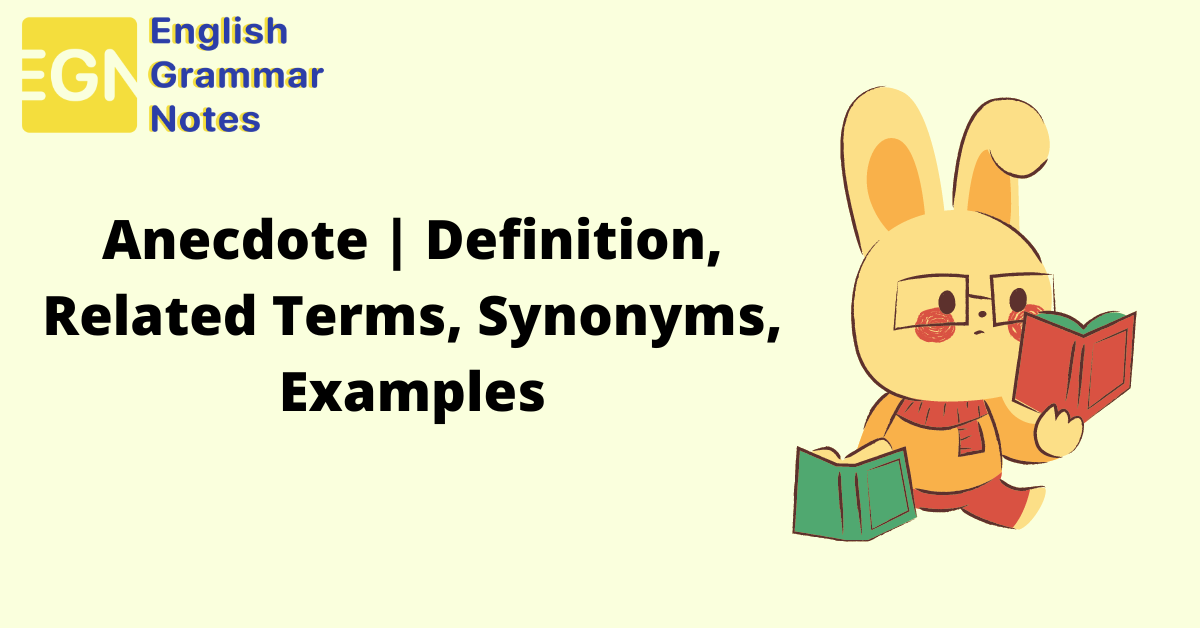Anecdotes are common literary devices used in everyday speech as well as literature. The term “anecdote” has its roots in a Greek phrase meaning “things unpublished.” In this article, you will be introduced to all the essential information about anecdotes, including their definition, types, significance, related terms, etc.
- What Is an Anecdote?
- Types of Anecdotes
- Importance of Anecdotes
- Anecdotes Related Terms
- FAQs on Anecdotes
What Is an Anecdote?
An anecdote, pronounced an-ik-doht, refers to a very short story that is relevant to the topic at hand. It usually adds more knowledge to the topic already discussed. That is, anecdotes are added to support or demonstrate the main idea in a work. Hence, anecdotes are stories. It is conveyed or told through speech; it is spoken rather than written down.
Types of Anecdotes
Anecdotes can appear in different forms. Some of these include:
- It injects levity into the existing content.
- Anecdotes from the Past: A story about the past or memories of the past.
- Philosophical Anecdotes: These types of anecdotes make people think deeply about a subject.
- Inspirational Anecdote: As the name suggests, these types of anecdotes inspire people to think positively.
- Cautionary Anecdotes: These warn readers about impending danger.
Also read,
Importance of Anecdotes
For several reasons, anecdotes remain an important element in literature. These include:
- Anecdotes help in making conversations personal and interesting.
- It helps the audience or characters laugh or think more deeply about a topic.
- Anecdotes give background information.
- It creates depth and adds mystery to a story.
- Anecdotes can also serve the purpose of warning readers.
Learn Grammar concepts easily by using our English Grammar Notes website. It will improve your communication skills easily.
Anecdotes Related Terms
Given below are terms that are often confused as an anecdote. However, both these terms have their own distinct definitions.
- It refers to something that has been said by an individual. It is not necessarily a story.
- A Flashback is a plot device through which the readers get to know the past events of the story.
- A frame story happens when a character tells another story to the other characters around him/her.
FAQs on Anecdotes
Q1. What is an anecdote?
Ans. An anecdote, pronounced an-ik-doht, refers to a very short story that is relevant to the topic at hand. It usually adds more knowledge to the topic already discussed.
Q2. Why is it important to use anecdotes?
Ans. The use of anecdotes has several advantages. Anecdotes can be used to pique the reader’s interest. It is used to incite laughter in the readers. Anecdotes also help the audience to reflect on a topic in depth.
Q3. What are the different types of anecdotes?
Ans. The various kinds of anecdotes include humorous anecdotes, reminiscent anecdotes, cautionary anecdotes, philosophical anecdotes, etc.
Q4. What is a philosophical anecdote?
Ans. These types of anecdotes make people think deeply about a subject.
Conclusion
Anecdotes are useful literary devices as they provide diversity in style and tone. Anecdotes can be used by anyone and in any situation. Just like any story, anecdotes have various purposes and make situations more interesting for the characters as well as the readers. Hence anecdotes can be treated as devices that are used across various fields like literature, film, television, theatre, etc. The use of anecdotes makes your story interesting and intriguing.
